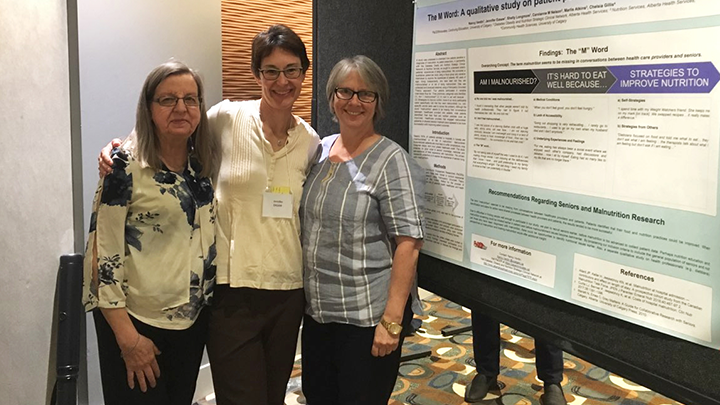
September 24, 2019

Patient and Community Engagement Researchers (PaCER) interns — Nancy Verdin, left, Jen Easaw and Shelly Longmore — recently presented their findings on malnutrition at the Strategies for Patient-Oriented Research (SPOR) Summer Institute.
Story by Karolina Sekulic
Being malnourished means not getting adequate nutrition for health — and patients’ experiences with malnutrition can be complex. Almost 50 per cent of adults and 30 per cent of children are already malnourished by the time they’re admitted to AHS for treatment.
This year’s Canadian Malnutrition Awareness Week runs Sept. 23-27. It’s a chance for healthcare professionals to raise awareness of the importance of nutritious food in our lives. Besides maintaining good health, food plays both a social and emotional role in our well-being.
Understanding how patients perceive a diagnosis of malnutrition is useful in guiding patient-centred strategies to address it. This is why the Diabetes, Obesity, and Nutrition Strategic Clinical Network (DON SCN) recently backed a study to explore the experience of older adults diagnosed with malnutrition or were at risk of malnutrition.
This study was conducted by Patient and Community Engagement Researchers (PaCER), a group of former patients trained to conduct qualitative health research.
“When patients talk to other patients, we get rich data and very practical recommendations,” says Chelsia Gillis, a doctoral student who oversees the project.
Nancy Verdin, one of three patient researchers, adds: “My PaCER research group joined the DON SCN to understand patient experiences and perceptions of malnutrition.
“Initially, I was just curious about the topic of malnutrition, but then when I learned that the first person who consented to be contacted for our study had died because of malnutrition-related complications, everything changed. The impact of her passing was profound — and the importance of understanding and treating malnutrition became quite evident to me.”
One patient interviewed for the study said they didn’t feel malnourished: “I see that picture of a starving child. I am not starving obviously, because I am overweight and living in a land of plenty, (with) access to food, knowledge of food. How can I be malnourished?”
Another interviewee said — “going out shopping is very exhausting” — in describing one of the challenges of eating well.
A third patient, not wishing to worry their loved ones, added: “The last thing I need my family to know is that I am potentially in trouble.”
Canadian Malnutrition Awareness Week also promotes education and tools to help health providers address malnutrition. Many factors can impact a patient in hospital, or in the community, in getting adequate nutrition — such as appetite, difficulty chewing or swallowing, depression, difficulty getting groceries or preparing meals, eating alone, or not having enough money for food, among others.
We encourage healthcare providers to access webinars offered by the Canadian Malnutrition Task Force or to visit ahs.ca/malnutrition to check out resources for providers and patients as we talk about how to reduce the risk for patients in hospital and others in the community.